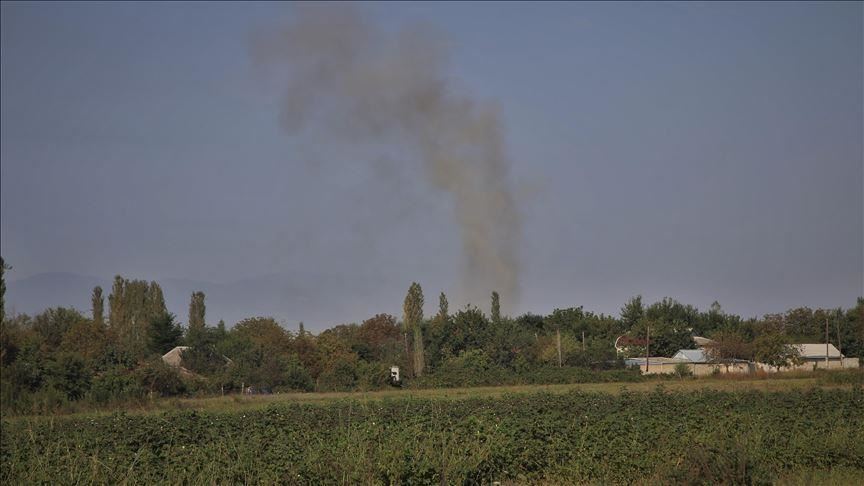'Armenia fully responsible for present situation'
Armenian army in occupied Upper Karabakh, surrounding regions of Azerbaijan, poses threat to regional peace, say authorities

ANKARA
Full responsibility for the present situation on the Armenian-Azerbaijani border falls squarely on the political and military leadership of Armenia, Azerbaijan’s Foreign Ministry said on Sunday.
"Another [act of] aggression by Armenia against Azerbaijan is a blatant violation of fundamental norms and principles of international law, international humanitarian law, including the Geneva Conventions of 1949 and their Additional Protocols, as well as United Nations Security Council Resolutions 822, 853, 874, 884 of 1993, demanding the immediate and unconditional withdrawal of the armed forces of Armenia from the occupied territories of Azerbaijan," the ministry said in a statement.
The Azerbaijani Armed Forces undertook counter-offensive measures under the nation’s right to self-defense and in full compliance with international humanitarian law in order to thwart further military aggression by Armenia and provide security to densely populated civilian residential areas, it said.
Calling the illegal presence of the Armenian army in occupied Upper Karabakh and surrounding regions of Azerbaijan a serious threat to regional peace and security, the ministry called on the international community to "strongly" condemn Armenia’s policy of aggression and provocative activities against Azerbaijan.
Upper Karabakh, or Nagorno-Karabakh, an internationally recognized territory of Azerbaijan, has been under illegal Armenian occupation since 1991.
The ministry also stressed that the international community should force Armenia to comply with international law, "including its commitments under international humanitarian law."
Civilian areas targeted by bombs
"The bombardment of densely populated civilian areas and installations situated along the front line by Armenia's armed forces has been deliberate and targeted," Hikmat Hajiyev, assistant to the president and foreign policy chief for Azerbaijan's Presidency, said in a statement.
Early on Sunday, using large-caliber weapons, mortar launchers, and artillery, the Armenian army launched an intensive attack on the positions of the Azerbaijani Armed Forces along the frontline, as well as the villages of Gapanli of in the Tartar district, Chiragli and Orta Garavand in the Aghdam district, Alkhanli and Shukurbayli in the Fuzuli district, and Jojug Marjanli in the Jabrayil district, he said.
He underlined that under international law, the Armenian strikes against the positions of Azerbaijan's army and against civilians and civilian infrastructure with the use of large-caliber weapons are yet another act of Armenian military aggression and a use of force against the country.
Hajiyev said the Azerbaijani army undertook necessary counter-offensive measures to thwart Armenia's military aggression and ensure the security of the civilian population.
Azerbaijan repeatedly warned the international community that Armenia was preparing for a "new act of aggression and war," he said.
"The responsibility for the present situation and future developments lie squarely with Armenia's political-military leadership,” he added.
Azerbaijani army not targeting civilians
In a written statement, Azerbaijani Defense Ministry said that unlike the Armenian side, the Azerbaijani army does not target civilians.
"We officially announce that the Azerbaijan Army does not target the civilian population, civilian facilities, or civilian infrastructure. Unlike the occupying country Armenia, during military operations, Azerbaijan complies with the requirements of the regulation of international humanitarian law, including the Geneva Conventions," the ministry said.
The Armenian army deliberately places its firing points inside and near populated settlements, it added.
Meanwhile, the ministry also urged the civilian population in the occupied territories to stay away from military facilities.
Relations between the two former Soviet nations have been tense since 1991, when the Armenian military illegally occupied Upper Karabakh, or Nagorno-Karabakh, an internationally recognized territory of Azerbaijan.
Four UN Security Council and two UN General Assembly resolutions as well as decisions by many international organizations refer to this fact and demand the withdrawal of Armenia’s occupying forces from Upper Karabakh and seven other occupied regions of Azerbaijan.
Anadolu Agency website contains only a portion of the news stories offered to subscribers in the AA News Broadcasting System (HAS), and in summarized form. Please contact us for subscription options.

